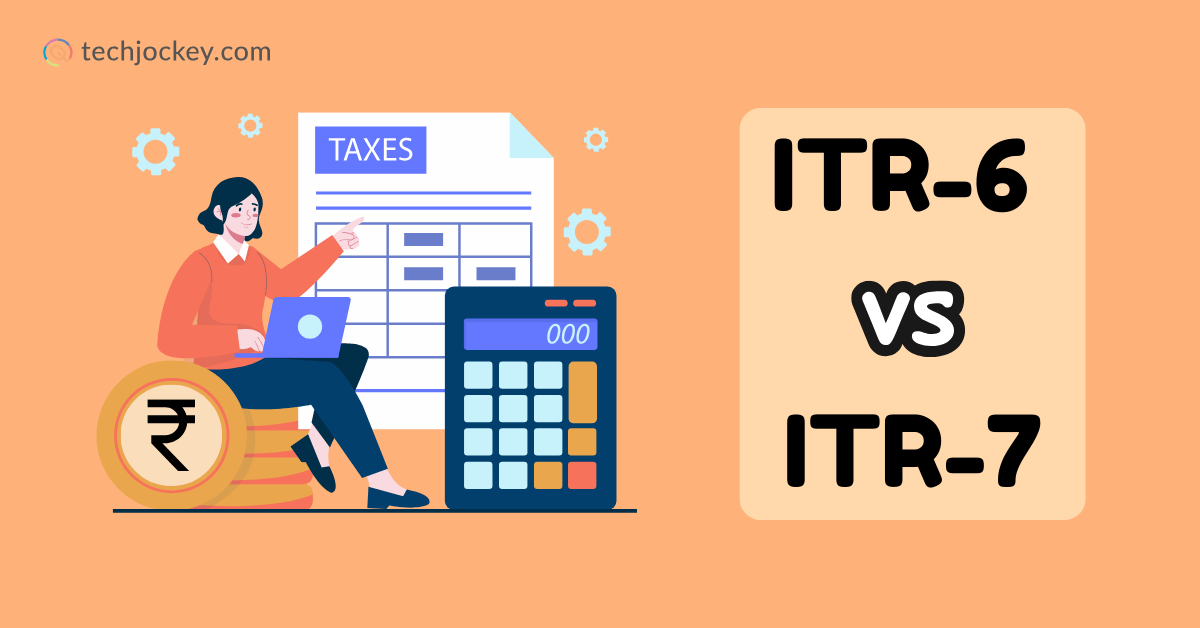
Not only is filing ITR on time essential, but choosing the right type of ITR form is also important. Not all ITR forms are fit for everyone!
Different taxpayers have to file different categories of ITR forms. Wrong filing could lead to penalties, legal notices or rejected form.
Two of such ITR forms are ITR-6 and ITR-7. Both are applicable to certain entities and not individuals. To make it clear, this blog post will discuss in detail about ITR-6 vs. ITR-7.
Let’s get started.
ITR-6 is the Income Tax Return form that is filed by companies that are registered under the Companies Act, 2013 (or any other law), which do not claim exemptions according to Section 11 of the Income Tax Act.
ITR-6 is for whom exactly?
Note: LLPs are not covered under ITR-6; they must file ITR-5.
ITR-7 is an Income Tax Return form for entities that have to file returns under certain sections of the Income Tax Act. These entities are mainly the organizations that are involved in charitable, religious, political, or research-related work.
ITR-7 applicability
The following are the respective sections under which the income of these entities qualifies for exemption and need to file ITR-7:
| Feature | ITR-6 | ITR-7 |
|---|---|---|
| Applicable To | Companies not claiming Section 11 exemption | Trusts, NGOs, political parties, educational & research institutions |
| Income Type | Business, profession, capital gains, house property, other sources | Donations, grants, voluntary contributions, other earnings |
| Exemptions | Not allowed under Section 11 | Available under Sections 11, 12, 13A, etc. |
| Digital Signature | Mandatory for companies | Mandatory for audited entities |
| Audit Requirement | Required if turnover exceeds prescribed limit | Required if gross income exceeds exemption limit |
| Filing Authority | Directors or authorized representatives | Trustees, CEOs, or principal officers |
Now that we’ve looked at ITR-6 and 7 individually, let’s compare them side by side to highlight the differences in detail:
Nature of Entity: ITR-6 is for companies engaged in business or profession, and ITR-7 is for trusts, political parties, NGOs, and institutions seeking exemptions.
Income Type
Exemptions
Filing Authority
Compliance Burden
The filing of ITR-6 is completely online by using the income tax e-filing portal. Below are some rules you need to consider while filing ITR-6:
Key Rules:
Suggested Read: How to File ITR-6 – Step by Step Guide
ITR-7 filing is also done online via the income tax portal. You can also use an income tax software to automate a few things and save time. Here are the key rules for filing ITR-7:
Key Rules:
Suggested Read: How to File ITR-7 – Complete Filing Guide
Filing income tax returns with the wrong form could result in serious consequences:
So, whether you are filing as a business entity or a charitable trust, knowing the difference between ITR-6 vs ITR-7 helps ensure compliance and smoother processing.
Conclusion
The decision between ITR-6 vs. ITR-7 depends on the type of taxpayer. Businesses that operate on a profit basis need to submit ITR-6, and those that have been formed to be charitable, political, or educational have to submit ITR-7.
Knowing everything in detail about ITR-6 and 7 such as the applicability, rules of filing and due dates would help you to avoid compliance errors.
To ensure that you are penalty-free, always cross-check on your eligibility, have the required audit reports, and file them within the due dates.
If you are still uncertain about the form you apply, it is better to seek help from a tax professional or a CA to save time and avoid expensive errors.
ITR-6 applies to all companies (both local or foreign) which are not exclaiming exemption according to the Section 11 of the Income Tax Act.
Charitable trusts, NGOs, political parties, research institutions, and universities that are obliged to report their financial transactions under sections 139(4A) 139(4D) use ITR-7.
No, trusts need file ITR form 7 if they are claiming exemptions. ITR-6 is not for trusts.
ITR-6 is applicable to business or profession and ITR-7 to charitable/religious institutions and political parties etc claiming exemptions.
In the modern world, every organization manages huge volumes of digital information, including emails and… Read More
In modern enterprise, Wi-Fi is like air. It is invisible, essential, and everywhere. But… Read More
Users often search the Internet to find private Instagram viewer tool when they want… Read More
Unplanned downtime costs industrial businesses nearly $50 billion every year, with equipment failure responsible for… Read More
Speed and user convenience are mostly the standard elements weighed when choosing payment gateway.… Read More
In today’s digital era, networks power everything from emails and payments to business operations. Traditional… Read More